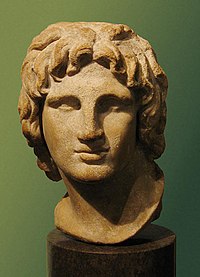Alexander the Great
 Alexander was born on the 6th day of the ancient Greek month of Hekatombaion, which may correspond to 20 (or 21) July 356 BC in Pella, the capital of the Ancient Greek Kingdom of Macedon. He was the son of the king of Macedon, Philip II, and his fourth wife, Olympias. Philip 2 chose Aristotle as the teacher for Alexander when Alexander was 13 years old. He was a master of martial arts and he gained excellent in studies. He features prominently in the history and myth of Greek and non-Greek cultures. Alexander was raised in the manner of noble Macedonian youths, learning to read, play the lyre, ride, fight, and hunt. He could also manage the horse even in young age. When his father was away from the country, Alexander governed the nation as the regent.
Alexander was born on the 6th day of the ancient Greek month of Hekatombaion, which may correspond to 20 (or 21) July 356 BC in Pella, the capital of the Ancient Greek Kingdom of Macedon. He was the son of the king of Macedon, Philip II, and his fourth wife, Olympias. Philip 2 chose Aristotle as the teacher for Alexander when Alexander was 13 years old. He was a master of martial arts and he gained excellent in studies. He features prominently in the history and myth of Greek and non-Greek cultures. Alexander was raised in the manner of noble Macedonian youths, learning to read, play the lyre, ride, fight, and hunt. He could also manage the horse even in young age. When his father was away from the country, Alexander governed the nation as the regent.

 Alexander was known as Alexander the Great because he was successful in conquering more than half of the world. Alexander had conquered so many kingdoms, no human could even possibly think about it. Alexander the great was known as the most powerful military leader and conqueror of the ancient world. He also became known as the Hellenistic Age, when the influence of Greece spread throughout the known world.
Alexander was known as Alexander the Great because he was successful in conquering more than half of the world. Alexander had conquered so many kingdoms, no human could even possibly think about it. Alexander the great was known as the most powerful military leader and conqueror of the ancient world. He also became known as the Hellenistic Age, when the influence of Greece spread throughout the known world.



No comments:
Post a Comment